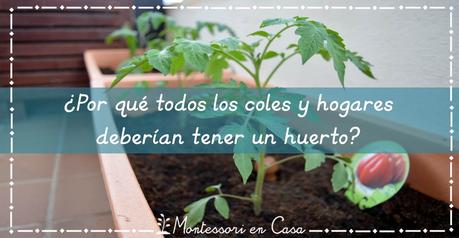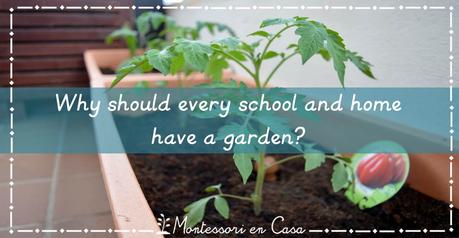
(scroll down for English)
Se ha escrito mucho sobre las ventajas de tener un huerto escolar o un huerto en casa para los niños, pero hoy os quiero hablar de este tema desde la perspectiva de Maria Montessori. Os cito sus propias palabras extraídas del libro "El método de la pedagogía científica":
No es como un método de instruir ni como una preparación profesional como estos trabajos han de interesarnos cuando se trata de niños pequeños. El concepto educativo en esta edad debe ser únicamente el de ayudar el desarrollo psico-físico del individuo.
El cultivo de plantas y la cría de animales encierran en sí medios preciosos de educación moral.
En este camino pueden distinguirse varias etapas:
- El niño se inicia en la observación de los fenómenos de la vida. [...] Poco a poco, creciendo el interés por la observación, aumenta también su cuidado por los seres vivos. [...]
- El niño se inicia en la previsión en virtud de la autoeducación. Cuando sabe que la vida de las plantas sembradas depende de su cuidado en regarlas, y la de los animales de su diligencia en proporcionarles alimento, el niño se mantiene vigilante como quien empieza a sentir una misión en la vida. [...] Entre el niño y los seres vivos que cuida nace una misteriosa unión que induce al niño a ejecutar determinados actos sin la intervención de la maestra, es decir, que lo conducen a una autoeducación. [...]
- Los niños aprenden a esperar con paciencia y con fe, que es toda una filosofía de vida. Cuando los niños depositan una semilla en la tierra y esperan que germine, cuando ven la primera aparición de la planta y presencian su crecimiento y sus transformaciones hasta llegar a producir flores y frutos; cuando observan que unas plantas germinan antes y otras después y cómo unas plantas tienen una vida breve y los árboles frutales un crecimiento más lento [...] adquieren un equilibrio de la conciencia lleno de paz. [...]
- Se desarrolla en los niños el sentimiento de la naturaleza. [...] El niño ama naturalmente las manifestaciones de la vida [...] Se trata, pues, de desarrollar este sentimiento de fe y confianza en los seres vivos, que vienen a ser una forma de amor y de unión con el universo. [...]
- El niño sigue el camino natural del desarrollo del género humano. Por último, esta educación armoniza la evolución individual con la de la humanidad. El hombre pasó del "estado de naturaleza" a un estado artificial a través de los trabajos agrícolas [...] y obtuvo la civilización como premio. El mismo camino ha de seguir el niño que está destinado a llegar a ser un hombre civilizado.
No dejemos que la falta de espacio sea una excusa para no tener un huerto escolar o un huerto en casa. Siempre digo que una simple maceta en la ventana puede ser suficiente, y la experiencia de Maria Montessori dice lo mismo:
En una "Casa dei Bambini" de Roma, no poseyendo terreno alguno cultivado, se habían dispuesto tiestos de flores alrededor de una terraza y plantas enredaderas a lo largo de las paredes. Los niños no olvidaron nunca regar las plantas con sus pequeñas regaderas.
Un día, los encontré sentados en el suelo formando corro alrededor de una espléndida rosa que se había abierto durante la noche. Permanecían silenciosos y tranquilos, verdaderamente sumidos en una muda contemplación.
Y la edad de los niños tampoco debe ser un impedimento! En este post os cuento cómo montar un huerto urbano con niños pequeños, y en mi ebook gratuito "El Huerto Urbano en el Entorno Montessori" encontraréis una recopilación de ideas para que los más pequeños puedan participar en el cuidado de las plantas.
¿Tienes vuestros hijos un huerto en casa o en el cole? Me encantaría que me contéis vuestras experiencias en los comentarios!
----

You have probably heard about the benefits of having a school garden or home garden, but today I want to talk about this issue from the perspective of Maria Montessori. I quote her own words taken from the book "The Montessori Method Scientific Pedagogy as Applied to Child Education in 'The Children's Houses'" (please note that I have translated the quotes from the Spanish version of the book, so they might differ from the English version)
It is not as a method of instruction or as a professional preparation as these works are to be concerned when it comes to young children. The educational concept at this age should be only to help the individual psycho-physical development.
Plant cultivation and animal husbandry itself contain precious means of moral education.
In this way we can distinguish several stages:
- The child begins in the observation of the phenomena of life. [...] Gradually, growing interest in the observation also increases theircare for living things. [...]
- The child is initiated in the anticipation under self-education. When they know that the life of cultivated plants depends on their careful watering, and animals on their diligence in providing food, the child remains vigilant as when one begins to feel a mission in life. [...] A mysterious union is formed between the child and the living things that induces the child to perform certain acts without the intervention of the teacher, that is, leading him to a self-education. [...]
- Children learn to wait patiently and with faith, which is a philosophy of life. When children deposit a seed in the ground and hope to germinate, when they see the first appearance of the plant and witness their growth and transformation up to produce flowers and fruits; when they observe that some plants germinate earlier and some later, and how some plants are short-lived and fruit trees grow more slowly [...] they acquire a balance of peaceful awareness. [...]
- The feeling of nature develops in children. [...] The child naturally loves the manifestations of life [...] It is, therefore, to develop this feeling of faith and confidence in living things, which come to be a form of love and union with universe. [...]
- The child follows the natural path of development of mankind. Finally, this education harmonizes with the individual evolution of humanity. The man went from the "state of nature" to an artificial state through agricultural work [...] and got civilization as a prize. The same path will follow the child who is destined to become a civilized man.
Do not let lack of space is an excuse for not having a school garden or a garden at home. I always say that a simple pot on the window may be enough, and the experience of Maria Montessori says the same thing:
In a "Casa dei Bambini" in Rome, not owning any land to be cultivated, we set pots of flowers around a terrace and climbing plants along the walls. Children never forgot watering plants with their little watering cans.
One day, I found them sitting on the floor in a circle around a splendid rose that had bloomed overnight. They were silent and quiet, truly mired in a silent contemplation.
And the age of the children should not be an obstacle either! In this post I explain how to set up an urban garden with toddlers and preschoolers, and the little ones can for sure participate in the care of plants.
Do your kids have a garden at home or at school? I'd love you to share your experiences in the comments!
Otros posts que te pueden interesar:
(Visited 1 times, 1 visits today)

